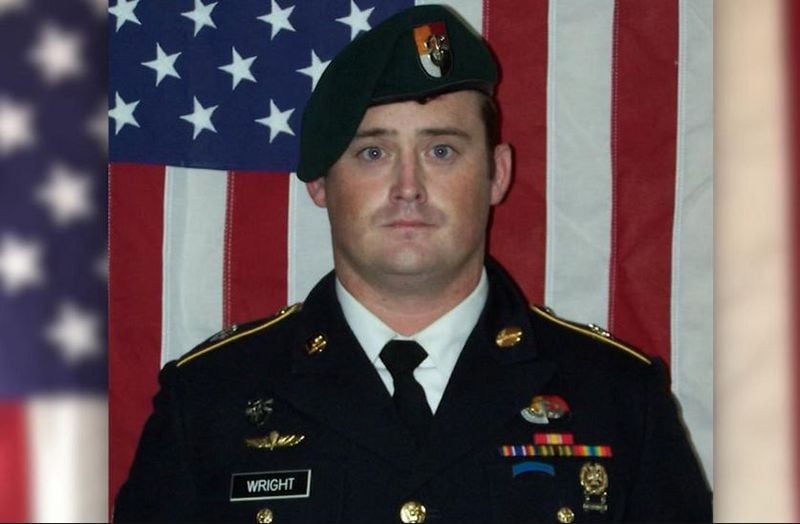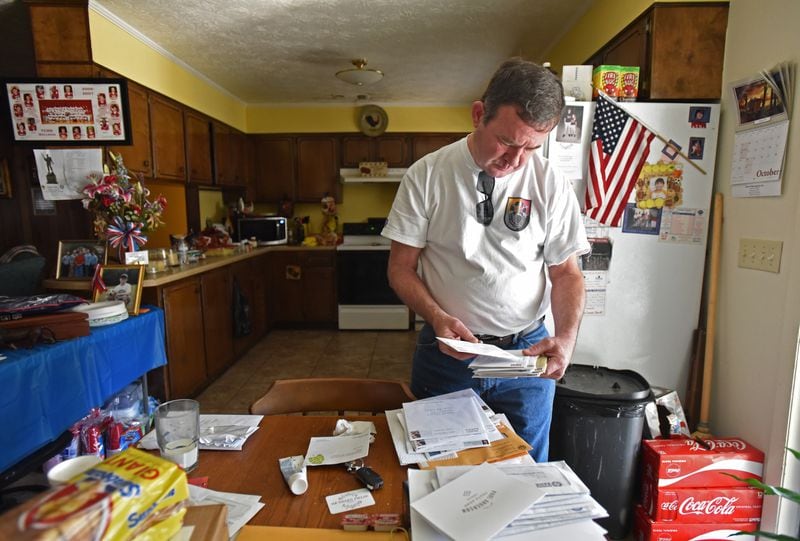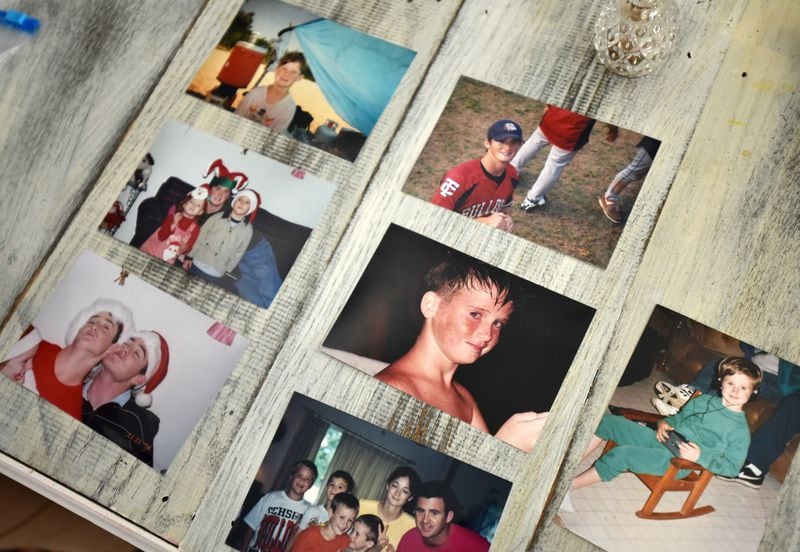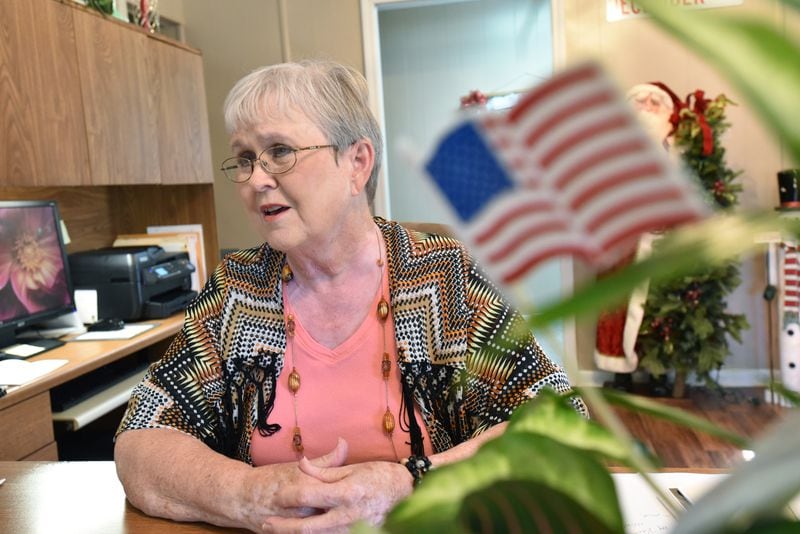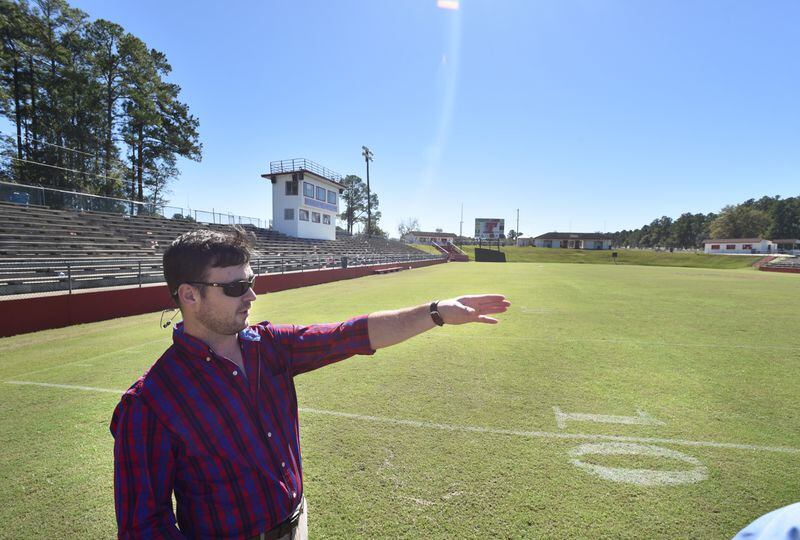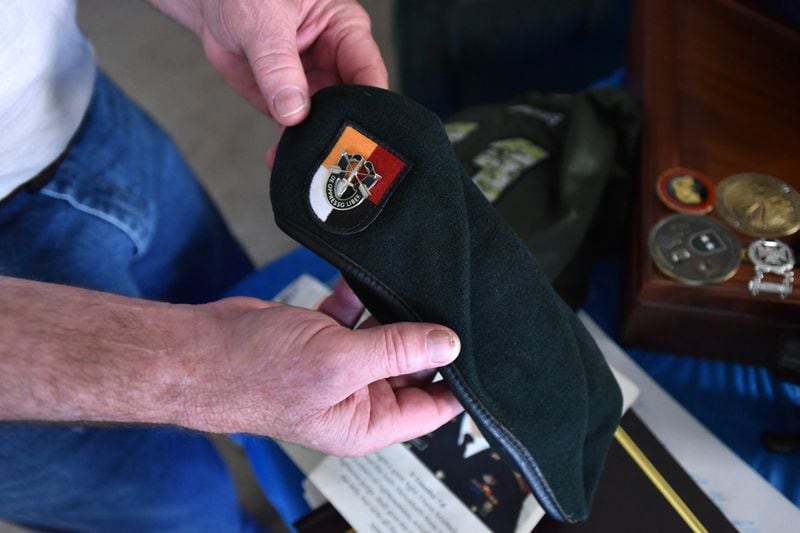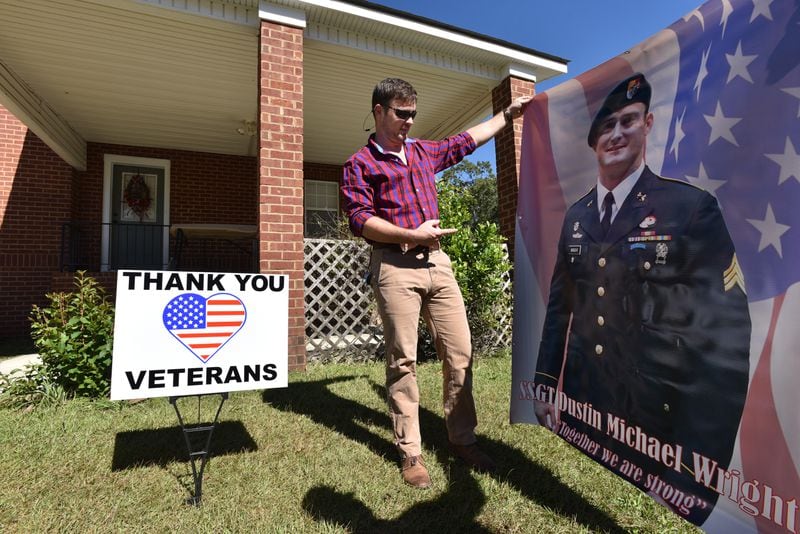Ardie Wright is sitting alone at his kitchen table, reminiscing about his son Dustin, the one he calls “a bright light in a dark room.” The shades are pulled down and Staff Sgt. Dustin Wright is gone, so a lonely darkness fills the Georgia home.
Topping 6 feet and 230 pounds, Dustin Wright was a giant, though he had a tender heart with a soft spot for Disney movies. A former offensive lineman for the Toombs County High School football team, he joined the U.S. Army, swiftly rose through the ranks and made it into the Special Forces as a barrel-chested Green Beret.
“He was like John Wayne, OK?” Ardie Wright said of his son, his voice threaded with grief. “When he walked through the door with his sparkling blue eyes — and his smile — he just lit the room up. Everybody knew who Dustin was. And everybody liked Dustin.”
Wright's 29-year-old son was among the four U.S. troops who were killed during the highly publicized Oct. 4 ambush in Niger. While Wright and his family are resisting getting pulled further into the controversy swirling around President Donald Trump's feud with the widow of one of the other slain soldiers, they are craving more information about what happened in Niger. The Pentagon has started an investigation and is vowing to share what it finds with them.
“I want them to tell the truth,” Wright says forcefully.
Gen. Joe Dunford, the chairman of the Joint Chiefs of Staff, shared some details with reporters this week while illuminating why U.S. soldiers are in a West African nation unfamiliar to many Americans. Since 2011, Dunford said, French and U.S. troops have trained thousands of local forces in West Africa to counter the Islamic State, al-Qaida and Boko Haram fighters massing in the region. The battle front in Africa is intensifying now that the Islamic State is being driven out of Iraq and Syria.
On Oct. 3, Dunford said, a 12-member U.S. Special Operations team was accompanying 30 Nigerien troops on a reconnaissance mission near the village of Tongo Tongo. Military leaders had determined enemy contact was “unlikely.” Yet, they came under attack the following day as they headed south back to their base in the capital city of Niamey. About 50 Islamic State-affiliated tribesmen ambushed them, firing small arms and rocket-propelled grenade launchers.
Inexplicably, the U.S. troops didn’t call for help until an hour into the firefight. A remotely piloted U.S. aircraft arrived overhead within minutes, surveilling the scene but not firing. And within an hour of the troops’ call for help, French Mirage jets arrived, though they also did not fire.
Three Green Berets, including Dustin Wright, were killed. Two other soldiers were wounded. A sixth soldier — Sgt. La David Johnson, 25 — was missing. His body was found two days later.
Dunford said “we owe the families of the fallen more information, and that’s what the investigation is designed to identify.”
Dustin Wright had been deployed to Niger once before. But Ardie Wright had a bad feeling about this mission, knowing his son would be going outside the wire.
A former Georgia National Guardsman whose relatives have served in the U.S. military going back at least as far as the War of 1812, the father believes the troops were not equipped properly and didn’t have adequate intelligence about the threats they faced. He also wonders about the possibility Nigerien villagers intentionally delayed the troops so they could be ambushed. And he says they should not have been deployed to Niger without American air support, “not French, not international — our guys, our pilots and our weapons.”
“There were a lot of errors,” Wright says. “This wasn’t like it just happened. It was more like the domino effect. The dominoes just rolled all the wrong way.”
Wright glances at a stack of sympathy cards rising from his kitchen table. He hasn’t had time to open them yet. People from across the country — neighbors, friends, even strangers — are writing to offer their condolences. Near the edge of his den, Wright has assembled a small tribute to his son. Dustin Wright’s green beret sits amid several framed photos of him and a folded U.S. flag the military presented to Ardie Wright.
Credit: HYOSUB SHIN / AJC
Credit: HYOSUB SHIN / AJC
Wright pulls a framed photo off a wall in his den and admires it. It’s him and three of his sons, all wearing recreation baseball uniforms. A divorced, single father, he coached them when they were young. Between games, they rotated their laundry between the washing machine and dryer, grabbing what they needed from the pile of clean clothes each morning. He raised his boys on deer meat and Hamburger Helper.
Wright summons fond memories about his son as a youngster. There was that time the boy cursed after burning his bare bottom on a heater. There was that time he took revenge on one of his older brothers by smacking him with a length of PVC pipe. His face turning red, Wright is laughing uproariously. But the tears in his eyes are hard to miss.
A child of Santa Claus
Wearing a red and white Christmas cap, Dustin Wright played Santa Claus every year. That meant it was his job to hand out presents to his family on Christmas Day. If someone else tried to supplant him, he would firmly remind them, “I’m Santa Claus.” Fittingly, Wright grew up in the city of Santa Claus, a tiny town with Christmas-themed street names, such as Candy Cane Street and Rudolph Way.
Credit: HYOSUB SHIN / AJC
Credit: HYOSUB SHIN / AJC
Wright’s childhood home in the city sits on a wooded tract across from a pond, where he and his brothers swam and fished. They swung on the branch of a pine tree by the driveway, hopped on a trampoline and glided down a water slide in their yard. Their property was thick with blackberries. So Wright and his brothers would bring them to their great-grandmother, who transformed them into jelly for her homemade biscuits.
People from all over the country stop in Wright’s hometown to get its highly coveted Santa stamp for their Christmas cards, the one that beseeches “Believe.” Working out of City Hall at 25 December Drive, Wright’s grandmother Sue Rustin Grisham is the city’s secretary, making her the keeper of the stamp. Children occasionally ring her phone, asking to speak to Kriss Kringle.
Grisham is sitting at her desk in front of a Christmas tree and a Santa Claus statue, remembering Wright as a short, chubby child who grew up to be a big man. He was tough, she recalls, but always smiling and laughing. Intelligent and sweet with big blue eyes and cute freckles, he loved dogs and gave big hugs. She remembers him assiduously working out in the gym and sparring with a local amateur boxer so he could get ready for basic training.
“He went to basic training, and we went over there,” she says. “And when I saw him, he was so skinny it scared me. I said: ‘Oh, Dustin. They’ve almost killed you.’ He said: ‘Grandmother, I should have been running. For six weeks, all I’ve been doing is running. I should not have been doing anything but running.’ ”
Asked about the military probe of what happened to her grandson, Grisham says she doesn’t want to think about it.
“He knew that they weren’t there to fight — they were there to help the people,” she says, her voice rising to the edge of a sob. “He knew that. I knew that. We all knew that.”
Credit: HYOSUB SHIN / AJC
Credit: HYOSUB SHIN / AJC
Grisham, meanwhile, is struck by how many people — friends and even strangers — have paid tribute to Wright. Hundreds of flag-waving Georgians saluted as her grandson’s remains were driven to the funeral home in Vidalia. His death, Grisham says, has unified people in support of something much bigger than him.
“They are celebrating an American hero,” she says. “I told them in the chapel last Sunday, they were here to celebrate Dustin. But I feel they were here as much to just celebrate America.”
Back home on the 50-yard line
Will Wright strides through a gate, past a pile of stray peanut shells and down a long tunnel, his footsteps echoing in the shadows. He emerges under a bright sun in the red-trimmed Booster Stadium, nicknamed “The Pit.” High school football is wildly popular in Lyons, which has a long-running rivalry with Vidalia. But it’s a Tuesday afternoon, so the grass field is empty. Resting on their sides in the stands, the fans’ “shakers” — plastic milk jugs filled with gravel — are quiet. Wright picks one up and briskly shakes it for a demonstration.
He is showing some visitors where his younger brother and best friend wowed fans on the gridiron. This is also where hundreds of people from across the nation turned out to see Dustin Wright’s final return home.
Credit: HYOSUB SHIN / AJC
Credit: HYOSUB SHIN / AJC
Uniformed soldiers carried Wright’s flag-draped casket to a spot on the 50-yard line. A musician performed taps on a set of bagpipes. A fellow soldier eloquently recounted how Wright saved him from drowning during a training exercise. Wright’s football coach movingly spoke about his dedication to his team. The crowd recited the Pledge of Allegiance and sang the national anthem.
Will Wright rode his brother’s black Harley-Davidson to the stadium as part of the funeral procession. When it was his turn to speak at the service, Wright sighed, taking a moment to collect himself. Then he read a message that was texted to him by his brother during his first deployment to Niger. Dustin Wright was about to miss a family reunion because of his mission, so he wanted his brother to relay some thoughts for him.
“The bond that our family shares through all the misfortunes and trials is truly something that everyone should take notice of. Our family’s ability to come back from despair and then flourish is nothing short of astonishing.”
Will Wright, a former Georgia National Guardsman who fought in Afghanistan, turned to the many soldiers who had gathered to say goodbye on that football field and told them they were now a part of the family.
“While our family is grieving, it just got a lot bigger,” he told them. “You will always be welcome here. You are a part of our family. You have a piece of our heart.”
Credit: HYOSUB SHIN / AJC
Credit: HYOSUB SHIN / AJC
Wright has mixed feelings about the Pentagon investigation. He wants to know what happened in his brother’s final moments. At the same time, he is aware of the long odds the soldiers faced during the ambush and says the outcome, more than likely, wouldn’t have changed, regardless of what resources they had.
“For me, I have peace because I know my brother was born for that moment,” says Wright, who experienced his own firefights in Afghanistan. “And if you gave him a choice to be here today and told him it would cost somebody else’s life, there is no way he would change that. He would have gladly stayed right there and fallen just like he did so somebody else could come home.”
“It kills me. And there will be days when I don’t want to get out of bed,” he continues. “But he also is right there standing up and telling me: ‘Come on. We are not quitting. We are not done yet.’ This is who he is. And it does hurt. And no story or no details or no answers from a report are ever going to change that.”
But Wright believes the military’s findings could help prepare the next group of soldiers deploying to Niger.
“That is what we owe our men who gave their lives,” he says, “and the men who are still fighting.”
He walks next door to the empty baseball diamond where Dustin Wright played second base in high school and dwells there for a moment. Then he heads back through the stadium tunnel, swings his leg over the rumbling motorcycle and rides off, the wind billowing his red and blue plaid shirt, the bike connecting him to his brother.
Credit: HYOSUB SHIN / AJC
Credit: HYOSUB SHIN / AJC

